Intro
Discover throat abscess symptoms, causes, and treatment options. Learn about peritonsillar abscess, quinsy, and tonsillar abscess, including diagnosis, antibiotics, and home remedies for relief.
Throat abscesses are a serious medical condition that requires prompt attention. A throat abscess is a collection of pus that forms in the tissues of the throat, often as a result of a bacterial infection. It can cause severe pain, difficulty swallowing, and breathing problems. In severe cases, a throat abscess can lead to life-threatening complications, such as sepsis or respiratory failure. Therefore, it is essential to recognize the symptoms of a throat abscess and seek medical attention immediately.
Throat abscesses can affect anyone, but they are more common in people with weakened immune systems, such as those with diabetes, HIV/AIDS, or undergoing chemotherapy. Additionally, people who smoke or have a history of tonsillitis or other throat infections are also at higher risk of developing a throat abscess. The symptoms of a throat abscess can vary depending on the location and size of the abscess, but common signs include severe throat pain, difficulty swallowing, fever, and swollen lymph nodes in the neck.
Throat abscesses can be diagnosed through a physical examination, imaging tests such as CT scans or MRI, and laboratory tests to identify the underlying cause of the infection. Treatment for a throat abscess typically involves antibiotics to clear up the infection, as well as drainage of the abscess to remove the pus. In some cases, surgery may be necessary to drain the abscess or remove any damaged tissue. It is crucial to seek medical attention if you suspect you have a throat abscess, as prompt treatment can help prevent serious complications and promote a full recovery.
Understanding Throat Abscesses
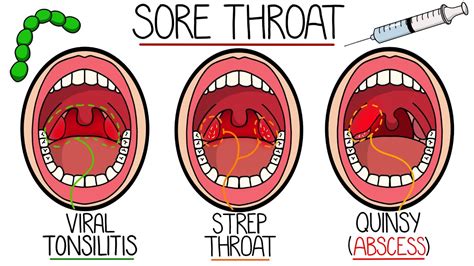
Throat abscesses are typically caused by bacterial infections, such as strep throat or tonsillitis. The bacteria can infect the tissues of the throat, leading to the formation of an abscess. In some cases, a throat abscess can also be caused by a viral infection, such as mononucleosis. The symptoms of a throat abscess can vary depending on the location and size of the abscess, but common signs include severe throat pain, difficulty swallowing, fever, and swollen lymph nodes in the neck.
Types of Throat Abscesses
There are several types of throat abscesses, including peritonsillar abscesses, retropharyngeal abscesses, and parapharyngeal abscesses. Peritonsillar abscesses occur near the tonsils, while retropharyngeal abscesses occur in the tissues at the back of the throat. Parapharyngeal abscesses occur in the tissues on the side of the throat. Each type of abscess requires prompt medical attention to prevent serious complications.Symptoms of Throat Abscesses
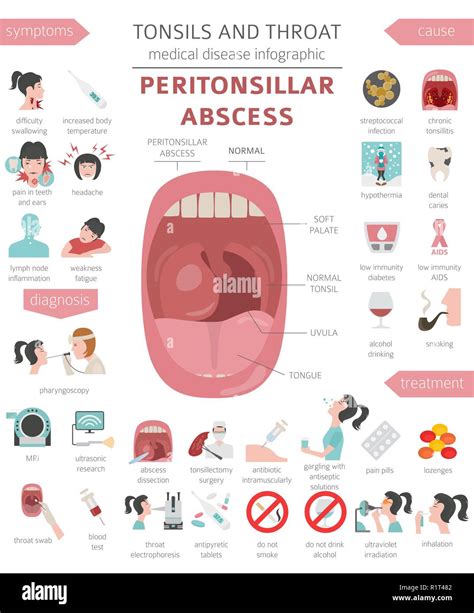
The symptoms of a throat abscess can vary depending on the location and size of the abscess, but common signs include:
- Severe throat pain
- Difficulty swallowing
- Fever
- Swollen lymph nodes in the neck
- Sore throat
- White patches on the tonsils
- Bad breath
- Swollen tongue
- Muffled voice
Diagnosing Throat Abscesses
Throat abscesses can be diagnosed through a physical examination, imaging tests such as CT scans or MRI, and laboratory tests to identify the underlying cause of the infection. A doctor may use a laryngoscope to examine the throat and look for signs of an abscess. Imaging tests can help determine the size and location of the abscess, while laboratory tests can identify the type of bacteria causing the infection.Treatment Options for Throat Abscesses
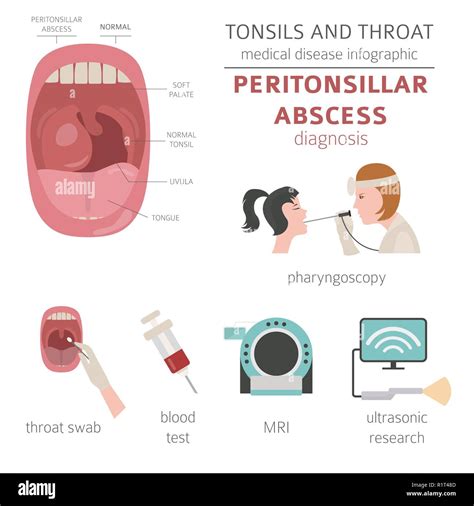
Treatment for a throat abscess typically involves antibiotics to clear up the infection, as well as drainage of the abscess to remove the pus. In some cases, surgery may be necessary to drain the abscess or remove any damaged tissue. The goal of treatment is to eliminate the infection, reduce symptoms, and prevent serious complications.
Antibiotics for Throat Abscesses
Antibiotics are commonly used to treat throat abscesses, as they can help clear up the underlying bacterial infection. The type and duration of antibiotic treatment will depend on the severity of the infection and the type of bacteria causing it. It is essential to complete the full course of antibiotic treatment, even if symptoms improve before finishing the medication.Complications of Throat Abscesses
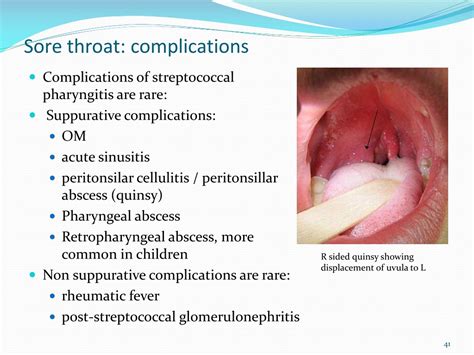
If left untreated, throat abscesses can lead to serious complications, such as:
- Sepsis: a life-threatening condition that occurs when the infection spreads to the bloodstream
- Respiratory failure: a condition that occurs when the abscess blocks the airway, making it difficult to breathe
- Abscess rupture: a condition that occurs when the abscess bursts, releasing pus into the surrounding tissues
- Mediastinitis: a condition that occurs when the infection spreads to the tissues in the chest
Preventing Throat Abscesses
While it is not always possible to prevent throat abscesses, there are steps you can take to reduce your risk of developing one. These include: * Practicing good hygiene, such as washing your hands regularly * Avoiding close contact with people who have throat infections * Getting vaccinated against certain bacteria, such as Haemophilus influenzae type b (Hib) * Quitting smoking, as smoking can increase your risk of developing a throat abscessLiving with a Throat Abscess
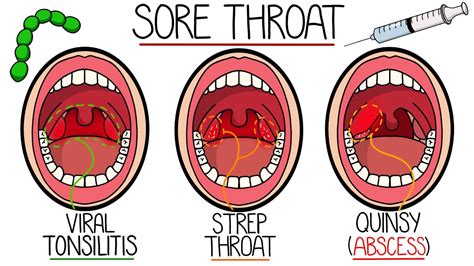
If you have a throat abscess, there are steps you can take to manage your symptoms and promote healing. These include:
- Getting plenty of rest
- Staying hydrated by drinking plenty of fluids
- Using a humidifier to add moisture to the air
- Avoiding irritants, such as smoke and pollution
- Taking over-the-counter pain relievers, such as acetaminophen or ibuprofen, to reduce pain and fever
Coping with the Emotional Impact of a Throat Abscess
Having a throat abscess can be a stressful and emotional experience. It is essential to seek support from friends, family, or a therapist to cope with the emotional impact of the condition. Additionally, joining a support group can connect you with others who have experienced similar conditions, providing a sense of community and understanding.What are the symptoms of a throat abscess?
+The symptoms of a throat abscess include severe throat pain, difficulty swallowing, fever, and swollen lymph nodes in the neck.
How is a throat abscess diagnosed?
+A throat abscess can be diagnosed through a physical examination, imaging tests such as CT scans or MRI, and laboratory tests to identify the underlying cause of the infection.
What are the treatment options for a throat abscess?
+Treatment for a throat abscess typically involves antibiotics to clear up the infection, as well as drainage of the abscess to remove the pus. In some cases, surgery may be necessary to drain the abscess or remove any damaged tissue.
Can throat abscesses be prevented?
+While it is not always possible to prevent throat abscesses, there are steps you can take to reduce your risk of developing one, such as practicing good hygiene, avoiding close contact with people who have throat infections, and getting vaccinated against certain bacteria.
What are the complications of a throat abscess?
+If left untreated, throat abscesses can lead to serious complications, such as sepsis, respiratory failure, abscess rupture, and mediastinitis.
In conclusion, throat abscesses are a serious medical condition that requires prompt attention. If you suspect you have a throat abscess, it is essential to seek medical attention immediately. By understanding the symptoms, diagnosis, treatment options, and complications of throat abscesses, you can take steps to manage your symptoms and promote healing. Remember to practice good hygiene, avoid close contact with people who have throat infections, and get vaccinated against certain bacteria to reduce your risk of developing a throat abscess. If you have any questions or concerns, do not hesitate to reach out to a healthcare professional for guidance and support. We encourage you to share this article with others who may be experiencing similar conditions, and to comment below with any questions or personal experiences you would like to share.
